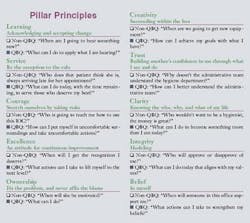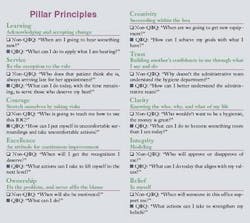A question for the ghost
By Kristine A. Hodson
A few weeks ago, a white knuckled patient, Telula, was in our office for a new patient exam. During the doctor's examination, the doctor pulled me in to help plan Telula's periodontal services, including chlorhexidine rinse, scaling and root planning with local antimicrobial therapy, fluoride varnish, full-mouth probing, re-evaluation, power toothbrush, and home fluoride therapy. He wanted make sure the appointments were long enough. Due to her crippling fear, Telula agreed to take an anti-anxiety prescription medication before each appointment. She told the doctor she doesn't normally like to take "drugs," and requested longer appointments. We scheduled her for two 90-minute sessions. Since she did not have a complete dentition, I thought this would be enough time to deliver the services and education.
Let me provide a little background into a phenomenon I have in my office, which I'm sure some readers can relate to: the "computer ghost." Yes, many offices have such a ghost, whose main goal is to change the schedule in the computer. Whether it's by adding appointments, deleting them, double booking, or even shortening appointments to add additional patients, the ghost is trouble. Our computer ghost isn't always around. She visits in spurts, probably because she visits all the other dental offices in the country and plays tricks with their appointment books as well.
Anyway, yesterday, as I was reviewing my weekly charts, Telula's appointment time had fallen victim to the "computer ghost," and was reduced to 60 minutes. Now Telula, who was mustering up all the courage she could after 46 years of fear and dental skepticism, was expecting to have her entire left side treated. Let me ask, has anyone else ever experienced a schedule change, and no one in the office knows how it happened? How do you respond when this happens? How do you react when the "computer ghost" or any other daily annoyance occurs?
I admit I used to get very angry, and complain loudly by asking, "Doesn't anyone value hygiene in this office?" or "Who did this to my schedule?"
Yesterday, when this happened, I was tempted to react like a mother protecting her young and attack any administrator nearby. But I stopped short and instead asked myself, "How can I communicate more effectively the importance of not changing my appointment times because it ultimately affects patient care?"
When I asked myself that question, everything suddenly looked and felt different. I wasn't causing a blood vessel to pop in my neck, nor was I rallying the troops in support of the scheduler's beheading. I admit this is behavior I've been guilty of in the past.
Who caused this change in me? It was a friend, Cris Duval. Cris is a dental hygienist who practices with Brian McKay, DDS, at the Advanced Cosmetic and Laser Center in Seattle, Wash. She wisely recommended the book, The Question Behind the Question by John G. Miller. Since I have a quick pass to Amazon.com, I quickly read it, then read his first book, Personal Accountability. Both go hand in hand, and both are the foundation for this column.
I've learned that when we're faced with a challenge or frustration, our first instinct is to protect ourselves and look for someone to blame. For most of us, these are automatic defense mechanisms. As a result of our conditioning, we often ask questions such as, "Why doesn't she?" or "When will he?"
Miller believes that when we look behind those initial questions, we'll invariably find better and more challenging questions such as, "What can I do to make a difference?" or "What could I have done to prevent this situation?" These questions will lead to better answers.
The question behind the question (QBQ) is the accountable question. It is the question that explores what I could have done or how can I contribute? Read the difference in the following questions:
• "When is the doctor going to follow through on his hygiene promises?"
• QBQ: "What can I contribute to further the doctor's understanding of growing hygiene services?"
• "When will the patients understand our treatment options are the best?"
• QBQ: "How can I better understand the patient?"
To help readers easily apply the QBQ and personal accountability concepts and methods, Miller has created 10 Pillar Principles of Prosperity. These are learning, service, courage, excellence, ownership, creativity, trust, clarity, integrity, and belief.
For examples of questions behind questions for each pillar, see the related article below.
Telula was seen in the 60-minute time slot, and the patient after her who was mysteriously appointed, cancelled. In regards to taking positive action to prevent such ghostly mistakes, our hygiene manager and the administrative manager had lunch recently to discuss and try to better understand each other's challenges. I think our ghost may appear again, and as a team we're trying our own ghost-busting.
QBQ works. I've observed it first hand. Asking questions that begin with "what" or "how" are much more relationship-building and empowering than questions that begin with why, when or who. I know I've discovered the amazing difference personal accountability and the QBQ makes. "What can I do for you?"
Kristine A. Hodsdon, RDH, BS, is an international speaker, author, and software developer. She is the author of Demystifying Smiles: Strategies for the Dental Team. The book is available online at www.pennwell-store.com. She can be contacted about speaking or coaching at [email protected]. Visit her on the Web at www.reachhygiene.com.

